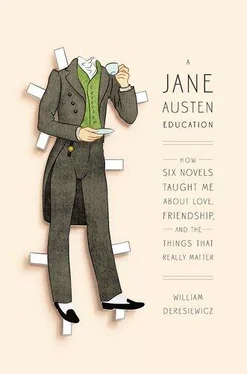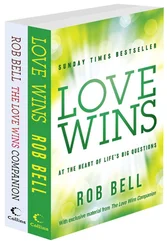This was a pretty unpromising bunch of people to begin with, and then all they seemed to do was sit around and talk : about who was sick, who had had a card party the night before, who had said what to whom. Mr. Woodhouse’s idea of a big time was taking a stroll around the garden. Reading the mail was the highlight of everybody’s day, and a shopping trip to Highbury, the little village near Hartfield where the Bateses lived—and where there seemed to be a total of one store—counted for the heroine as a major event.
I couldn’t believe how trivial this all was. In my other classes, D. H. Lawrence was preaching sexual revolution and Norman Mailer was cursing his way through World War II, and here I was reading about card parties. One whole chapter—Isabella had just brought her family home for Christmas—consisted entirely of aimless talk, as everyone caught up on one another’s news. For more than half a dozen pages, the plot simply came to a halt. But the truth was, for long stretches of the book there really wasn’t much plot to speak of. Things happened, story lines developed, but no single issue, no point of suspense, moved the story forward—especially not the one I’d been led to expect, the one about the heroine’s romantic future, which the book hardly even seemed to address.
What was the point of all those long, rambling speeches by Emma’s father? Here he was, talking to Emma about Isabella’s sons:
Henry is a fine boy, but John is very like his mama. Henry is the eldest, he was named after me, not after his father. John, the second, is named after his father. Some people are surprised, I believe, that the eldest was not, but Isabella would have him called Henry, which I thought very pretty of her. And he is a very clever boy, indeed. They are all remarkably clever; and they have so many pretty ways. They will come and stand by my chair, and say, “Grandpapa, can you give me a bit of string?” and once Henry asked me for a knife, but I told him knives were only made for grandpapas.
Emma undoubtedly knew all this, had heard it a hundred times. The information wasn’t for our benefit, either. The boys, their cleverness, and their desire for knives and string played no role whatsoever in the story. And we knew by then that Emma’s father was a tedious old man. So why did we have to listen to this?
Mr. Woodhouse, what was more, was nothing compared to Miss Bates. He driveled by the paragraph; she prosed by the page. I’d be sitting in a coffee shop, surrounded by people reading Kierkegaard or Chomsky, and get to a paragraph like this, where she told Emma about a letter she had just received from her niece, Jane Fairfax. Or tried to, anyway:
Oh! here it is. I was sure it could not be far off; but I had put my huswife upon it, you see, without being aware, and so it was quite hid, but I had it in my hand so very lately that I was almost sure it must be on the table. I was reading it to Mrs. Cole, and since she went away, I was reading it again to my mother, for it is such a pleasure to her—a letter from Jane—that she can never hear it often enough; so I knew it could not be far off, and here it is, only just under my huswife—and since you are so kind as to wish to hear what she says;—but, first of all, I really must, in justice to Jane, apologize for her writing so short a letter—only two pages you see—hardly two—and in general she fills the whole paper and crosses half. . . .
And that was only the first part of the speech, and we didn’t get to hear what the letter actually said for another page after that.
Mr. Woodhouse and Miss Bates—the dull old man, the scatterbrained neighbor—were the kind of people I tuned out in real life. I’d stare past them and hurry on my way, or nod absentmindedly and think about how I needed to get my library books renewed. I certainly didn’t want to spend my time reading about them.
The funny thing was, the heroine agreed with me. If I was bored with Highbury, so was Emma. She didn’t think that anything interesting was going on there either, and what little plot the novel had involved her determination to get things moving on her own. I wasn’t sure how I felt about this. On the one hand, I sympathized with her. On the other, she went about everything so blindly and willfully, and all her schemes turned out to be such disasters, that I found myself cringing almost every time she opened her mouth.
Early on, casting about for something to do, Emma struck up a friendship with a girl named Harriet Smith. Harriet was docile, ignorant, and naïve—a worshipful younger friend who flattered Emma’s vanity in every way. She was also very pretty— “short, plump, and fair, with a fine bloom, blue eyes, light hair, and a look of great sweetness”—and that gave Emma an idea. “Those soft blue eyes, and all those natural graces,” she thought, “should not be wasted.” Harriet “wanted only a little more knowledge and elegance to be quite perfect.” And so, like Henry Higgins sizing up Eliza Doolittle, Emma decided to turn her friend into a project. “She would improve her . . . and introduce her into good society; she would form her opinions and her manners. It would be an interesting, and certainly a very kind undertaking; highly becoming her own situation in life.”
This was really too much. Such arrogance, such nosiness—and from someone who was all of twenty herself, and scarcely less naïve than her friend. Emma gave herself credit for bringing about her governess’s marriage with a local gentleman—though all she’d really done was guess that it would happen—and now she set about arranging a match for Harriet with Mr. Elton, the new clergyman. The idea was ridiculous—Harriet was the illegitimate daughter of an unknown father, with no money or social standing—but Emma convinced herself otherwise.
Worse, she convinced her friend, persuading Harriet to turn down a proposal from a worthy young farmer, Mr. Martin, whom Harriet liked very much. The scene was excruciating, like watching someone torture a puppy:
“You think I ought to refuse him then,” said Harriet, looking down.
“Ought to refuse him! My dear Harriet, what do you mean? Are you in any doubt as to that? I thought—but I beg your pardon, perhaps I have been under a mistake. I certainly have been misunderstanding you, if you feel in doubt as to the purport of your answer. I had imagined you were consulting me only as to the wording of it.”
Harriet was silent. With a little reserve of manner, Emma continued:
“You mean to return a favourable answer, I collect.”
“No, I do not; that is, I do not mean—What shall I do? What would you advise me to do? Pray, dear Miss Woodhouse, tell me what I ought to do.” . . .
“Not for the world,” said Emma, smiling graciously, “would I advise you either way.”
Now I really couldn’t stand her. To play with someone else’s happiness, whether she knew it or not, simply for the sake of her own vanity! Just as Emma thought that no one in Highbury was good enough for her, so did she think that Mr. Martin wasn’t good enough for her friend—not because she thought so much of Harriet, but just because she was her friend. In the same way, she knew that Miss Bates and her mother were lonely women, teetering on the edge of poverty, and that a visit from her always made their day, but she could never bring herself to drop by as often as she knew she should, and when she did show up, she would find an excuse to run away as fast as possible. Jane Fairfax, Miss Bates’s niece, was an intelligent, talented, gracious young woman, right around the heroine’s age, who came to Highbury for a couple of months every year—but Emma did all she could to avoid her. Any relative of the lowly Miss Bates, after all, could hardly be a suitable companion for the great Emma Woodhouse.
Читать дальше












